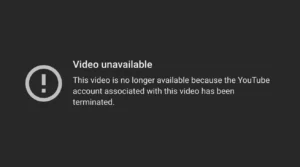Vimeo and YouTube Ban Revisionism
In early 2017, we had to deal with two major censorship incidents, one external, the other homemade. The external event refers to Amazon’s banning of Castle Hill’s entire book collection, no matter whether a book challenges the orthodox Holocaust narrative or addresses some other topic entirely. The second, internal event refers to Eric Hunt’s demand to take all his revisionist video documentaries offline, or else he would sue CODOH and Castle Hill for copyright violations. This concerned the following videos:
- The Last Days of the Big Lie (2009)
- The Jewish Gas Chamber Hoax (2014)
- The Majdanek Gas Chamber Myth (2014)
- The Treblinka Archeology Hoax (2014)
- Questioning the Holocaust: Why We Believed (2016)
The first events resulted in a loss of some 40% of Castle Hill’s and thus also CODOH’s turnover, while the second meant a crippling of our efforts to reach out to a wider community through video streaming platforms, and here primarily the almighty YouTube. However, after a somewhat challenging learning period, I managed to produce a series of documentaries myself, and then also turned to creating short promotion clips for new books released. The documentaries include:
- Curated Lie: The Auschwitz Museum’s Misrepresentations, Distortions and Deceptions (2016)
- The First Holocaust: The Surprising Origin of the Six-Million Figure (2016)
- The Lies and Deceptions of Deborah Lipstadt, Part 1 (2017)
- The Lies and Deceptions of Deborah Lipstadt, Part 2 (2017)
- The Chemistry of Auschwitz (2017)
- Probing the Holocaust: The Horror Explained, Part 1 (2017)
- Germany, Country under the Rule of Law: Role Model or Illusion? (2017)
- The Day Amazon Murdered History (2018)
All of these videos were doing quite well. In particular Probing the Holocaust, which had replaced Hunt’s Questioning the Holocaust, was getting hundreds of thousands of views, thus following in the footsteps of its Huntian predecessor that was getting close to going viral before we had to pull it in early 2017. Such success must have triggered the alarm in certain quarters, though.
On a much more moderate level of investment and consumer engagement are brief promotion clips of just a minute or two in length, geared toward advertising our books. These include:
- Special Treatment in Auschwitz (2016)
- Commandant in Auschwitz (2017)
- Auschwitz: A Three-Quarter Century of Propaganda (2018)
- Air-Photo Evidence (2018)
- An Auschwitz Doctor’s Eyewitness Account (2018)
- The Einsatzgruppen (2018)
- Auschwitz: Technique and Operation of the Gas Chambers (2019)
These were posted on our own shop sales pages as well as on YouTube, Vimeo and other social-media platforms.
If I remember correctly, since 2016, each time I posted a new video on YouTube, I promptly received a notification by YouTube that access to our videos had been banned from a long list of European countries. Since most European countries had outlawed challenging the orthodox Holocaust narrative by that time, this was to be expected. If YouTube wanted to do business in Europe, they had to comply with the local laws. But each time this notification came in, it made me keenly aware as to how delicate our presence on YouTube was. To be on the safe side, we always also posted out videos on Vimeo, just in case YouTube would pull the plug on us entirely.
In April of this year, we found out that Vimeo had deleted our account, without giving us the slightest warning. We therefore switched over to Bitchute as our backup. We were still in the process of doing this when we found out in May that our video channels with YouTube had been terminated as well. Just prior to this, YouTube had announced that they had added “Holocaust denial” to their growing list of “unacceptable use” items. Hence, we saw it coming.
YouTube has a near-monopoly as a platform for streaming videos. We all know our habits. We all go to YouTube to be entertained and informed.
Once, the internet was an equal-opportunity platform. Nowadays, however, it is dominated by monopolies or near-monopolies, such as Amazon, Wikipedia, Google, YouTube, Facebook, etc. And they all censor or filter to one degree or another. Well, Facebook does not yet do it, but that may be only a matter of time.

While I had slowed down my video production pace in 2018 mainly due to domestic issues, but also due to a long list of print books that we (re)issued due to special offers from our printers, I had planned to pick up in 2019 where I had left off in 2017. However, with YouTube and thus the world’s audience gone for good, and with Bitchute being microbial in size compared to YouTube, investing a lot of time in producing new video content has now been downgraded to a low priority. It simply is no longer an efficient way of marketing our products.
After Amazon crippled our option for selling our wares in early 2017, now YouTube has crippled our options to market them.
What’s next? I’m sure there will be a next step in this ever-increasing censorship frenzy of the powers that be. Just wait and see. I have an idea where and how they might strike next, as I know our weaknesses and vulnerabilities, and I’m sure the eternal enemy of free speech will figure those out, too, eventually.
We’ll keep going, though, as much and as fast as we can.
Bibliographic information about this document: Inconvenient History, 2019, Vol. 11, No. 2
Other contributors to this document:
Editor’s comments:
